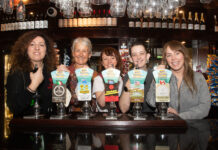11 July 2024: With Glastonbury Festival concluding last week and marking the start of the UK festival season, attention is turning to the future of music festivals and the importance of adopting environmentally friendly practices. As festivals worldwide consider their environmental impact, cities like Leipzig are implementing innovative steps to reduce the carbon footprint of these events.
Leipzig the ‘City of Music’
Leipzig has a rich musical history characterised by traditions and innovative changes. Visionaries like J. S. Bach and F. Mendelssohn moved and transformed the world of music, and this spirit of innovation continues today as Leipzig contributes to positive changes in the festival industry. The Leipzig Tourism and Marketing GmbH actively supports its partners in their efforts to minimise the environmental impact of Leipzig’s music festivals and inspire change within the industry.
The 3rd Green Culture Conference took place in Leipzig in December 2023 and brought together cultural professionals from across the creative industry and all German theatres and orchestras to discuss sustainable cultural practices. The City of Music Leipzig was honoured by Minister of State for Culture Claudia Roth as a pioneer of sustainable culture.
Recent changes implemented in some of Leipzig’s festivals include:
- Growing the Johann Sebastian Bach Forest for Bachfest Leipzig: Bach fans can support the passion project of the Bach Festival: the planting of the Bach Forest – 72 acres of mixed forest at Lake Störmthal, near the historic Bach place of Störmthal in the Leipzig Region. The Bach Archive Leipzig has been planting trees to compensate for CO2 emissions on former open-cast mining sites since 2013 and cooperates with the non-profit foundation ‘Forest for Saxony’.
- Oper Leipzig’s Climate-Neutral Premiere of the ‘Mary Queen of Scots’: In December 2023, the production of ‘Mary, Queen of Scots’ set new standards and explored the space between art and climate protection. The project by the Oper Leipzig team was the first attempt to comprehensively evaluate a major opera production and calculate the carbon footprint of all rehearsals and performances, with the long-term aim of producing a general guide for production teams.
- Leipzig and Dresden collaborate on a Climate Calculator for cultural institutions: The key to a carbon neutral production is to collect and understand the different core indicators and emission source data for a carbon footprint. The cities of Leipzig and Dresden have developed a new web-based climate calculator specifically for the cultural sector. With this climate calculator, cultural institutions can collect data on everything from the purchasing of fabrics and materials for costume production, to the travel by audiences and guest artists. The aim is to help festivals and other cultural institutions measure and reduce their carbon.
- Annual Waste Challenge at the Highfield Festival: Attendees at the Highfield Festival that takes place in August at Lake Störmthal are encouraged to take part in ‘Trasholution’ a waste challenge to keep the festival clean. There is also the option to purchase a ‘green ticket’ when booking accommodation and the festival partners with global projects to offer support, such as Viva con Agua who has been involved in the festival since 2008.
- Free public transportation included in Festival Pass: The WGT Wave-Gotik-Treffen is the world’s largest gothic festival that takes place on Whitsuntide weekend each year. The indoor and outdoor venues are spread all over the city, so a dedicated festival pass which is valid for all events, includes public transport in the city of Leipzig.
- Barrier-free accessibility in Leipzig: Sustainability also is about inclusion for all guests. The city of Leipzig has been producing more content on how to discover the city barrier-free, from attraction guides with wheelchair access information, to details on museum brochures written in braille. with reduced mobility, visual impairment, hearing impairment or learning difficulties. More information on how to discover Leipzig barrier-free here
Prof Dr. Michael Maul, Director of the Leipzig Bach Festival, comments:
“For the Bachfest, it is a central challenge and a matter close to our hearts to reconcile the festival’s great internationality – around 40 percent of guests travel from abroad, from over 50 countries. To offset the carbon footprint of our audience, organisers, guests, artists, and partners of the Bachfest have been financing the planting of the ‘Bach Forest’ for four years: an area of woodland covering around 30 hectares on the site of a former open-cast lignite mine. Bachfest 2025 will be held under the motto ‘Transformation,’ and measures to achieve climate neutrality in many areas of the festival’s organisation will be further intensified, including with the new ‘Climate Ticket’ price category.”
The Future of Music Festivals
Music festivals are essential in bringing people together and creating unforgettable experiences. However, their environmental footprint requires that festivals take responsibility and implement sustainable practices. The initiatives being adopted by festivals in Leipzig, along with other global examples, highlight the potential for the industry to innovate and adopt eco-friendly measures.
In order to better understand the future of music festivals and to find out which key factors are responsible for a high carbon footprint, Leipzig Tourismus und Marketing GmbH initiated a study on the sustainability of major festivals around the world.
Using data from over 75 sources, it took into account the average number of visitors, the travelling implications of visitors and artists and the running costs of music festivals. A ranking of the supposedly most environmentally damaging festivals was deliberately omitted, as the compensatory measures already undertaken by many festivals were not analysed. However, the following conclusion was interesting: the fans are not the problem – the artists are.
One might assume that the number of visitors travelling to the festivals is the biggest factor influencing the carbon footprint of a music festival. However, the study showed that the audience actually makes only a minimal contribution to the estimated carbon footprint of larger festivals. Instead, the artists’ travel accounts for the majority of the emissions. The CO2 emissions of the artists’ journey account for more than those of the fans. When comparing festivals with similar attendance figures and taking place over a similar period of time, the estimated tonnes of emissions are mainly due to the fact that more artists perform than at other festivals.
These examples demonstrate that it is possible to enjoy the cultural and social benefits of music festivals while also protecting the environment. From innovative waste management solutions to efforts in achieving climate neutrality, festivals worldwide are paving the way for a greener future.
For more information and further details of the methodology of the data research, visit this page.
Help keep news FREE for our readers
Supporting your local community newspaper/online news outlet is crucial now more than ever. If you believe in independent journalism, then consider making a valuable contribution by making a one-time or monthly donation. We operate in rural areas where providing unbiased news can be challenging. Read More About Supporting The West Wales Chronicle

























